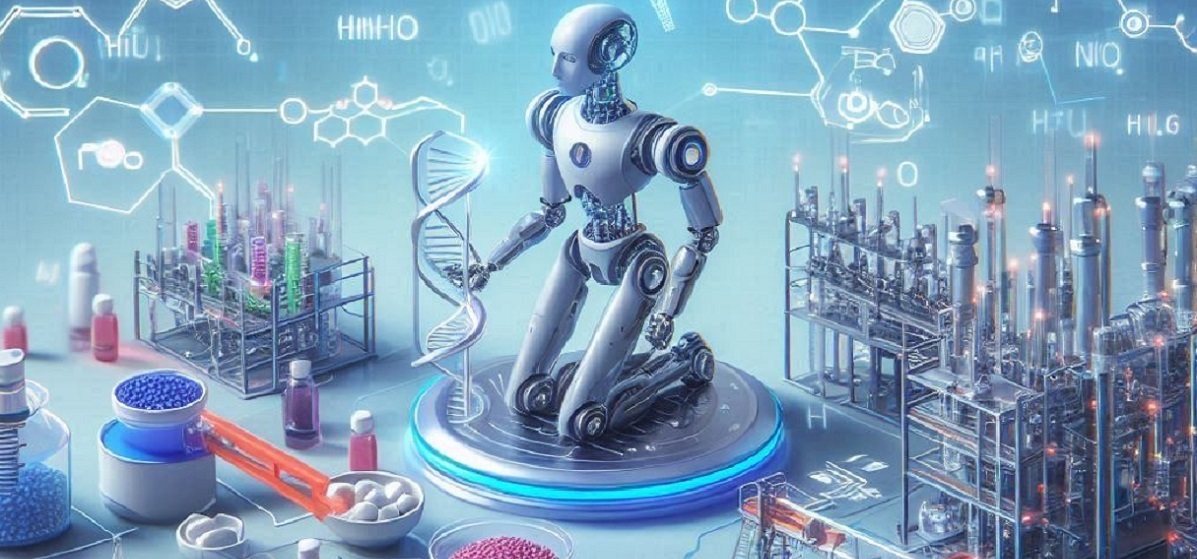What do a supercomputer and a medical capsule have in common? Far more than one might imagine.
The reality is that technology is revolutionising the pharmaceutical industry, not only in drug discovery processes but also in development and distribution.
The Internet of Things, data analytics, robotics, machine learning, blockchain, and, most notably, artificial intelligence, are increasingly influencing the operations of pharmaceutical companies.
These technologies empower research, optimise production, and enhance the lives of millions of people around the world.
Laboratory Algorithms
One of the areas undergoing the greatest transformation is research and drug discovery.
Artificial intelligence (AI) has been pivotal in this shift, enabling the analysis of vast quantities of biological and chemical data to identify medicines with unprecedented precision and speed.
Through machine learning algorithms and data analytics, researchers can predict how molecules will interact with various biological targets, significantly accelerating the discovery phase and reducing the costs associated with failed trials.
The Internet of Things (IoT), meanwhile, is facilitating the real-time collection of patient and clinical trial data, providing valuable insights for the design of new medicines.
This trend is growing: according to the annual CPHI (Convention on Pharmaceutical Ingredients) report, 60% of pharmaceutical company executives believe that by 2026, AI will be routinely used in drug research and discovery processes.
Biotechnology has also introduced advanced tools, such as the CRISPR (Clustered Regularly Interspaced Short Palindromic Repeats) gene editing technology, which enables scientists to modify specific genes in human and animal cells.
This creates models that more accurately replicate diseases, thereby improving the effectiveness and safety of new treatments.
The use of computer simulations has further optimised the development phase, allowing researchers to predict how compounds will behave in the human body before live trials.
This virtualisation not only accelerates development but also reduces the need for animal testing, aligning with current ethical and regulatory trends.
Biotechnology is one of the fastest-growing disciplines in the pharmaceutical industry. According to a forecast by the consultancy firm EY, companies in the sector will invest $1 billion this year in biotechnology innovation.
Safety and Efficiency at Every Step
The pharmaceutical industry's supply chain is also undergoing a profound transformation due to the adoption of emerging technologies.
These advances impact both the efficiency and transparency of supply chain management and the distribution of medicines, ensuring their authenticity and safety from production to the end consumer.
Blockchain has emerged as a crucial tool in addressing one of the industry's major challenges: counterfeit medicines.
By providing an immutable and transparent record of each step in the logistics chain, blockchain allows companies to trace the origin and history of every batch of medicines, ensuring that the products are genuine and meet quality standards.
This technology also facilitates the verification of data integrity, which is essential for compliance with healthcare safety regulations.
Robotics, on the other hand, is redefining efficiency in pharmaceutical warehouses and distribution centres. Robots are used for tasks such as packaging, labelling, and product transport, reducing processing time and minimising human error.
This automation accelerates product delivery, enhances inventory management, optimises operating costs, and improves responsiveness to changing market demands.
IoT also plays a key role in the real-time monitoring of critical conditions during the storage and transport of medicines, such as temperature and humidity.
Connected sensors allow pharmaceutical companies to ensure that products are maintained in optimal conditions throughout the supply chain, which is essential for preserving the efficacy of many medicines.
Key Partners for Transformation
The challenge facing the pharmaceutical industry is immense: incorporating advanced technology can be the difference between leading the market and falling behind competitors.
Laboratories and pharmaceutical companies worldwide are undergoing digital transformation processes or plan to do so in the near future.
However, for this change to be effective, it is essential to have strategic technology partners who provide the right tools and guide companies throughout the implementation process.
In such a specialised environment as the pharmaceutical sector, adopting technologies goes beyond merely integrating new systems. It involves understanding and adapting these solutions to the specific needs of the industry.
United VARs, the global alliance of SAP partners, is composed of a select group of technology companies that meet these high standards. They provide not only technical expertise but also industry experience, helping pharmaceutical companies navigate regulatory, safety, and operational challenges.
Moreover, the support of technology experts facilitates staff training and the cultural adjustment necessary for adopting these new tools, minimising resistance to change and ensuring a smooth transition.
A Promising Future
The future looks very promising for the pharmaceutical industry, albeit not without significant challenges. Adapting regulatory frameworks to these new technologies is a complex and ongoing process.
Ethical and privacy concerns related to the use of patient data also require careful attention.
Additionally, integrating these new technologies into existing systems and training staff present operational and financial challenges for many companies.
Despite these difficulties, incorporating technology remains a vital investment. The benefits extend beyond mere operational efficiency; they enable greater agility in drug development, optimise production, and strengthen responses to market demands.
In this new paradigm, technological innovation becomes the catalyst for progress, marking the beginning of an era where health and technology advance hand in hand to improve lives globally.

stronger than one
